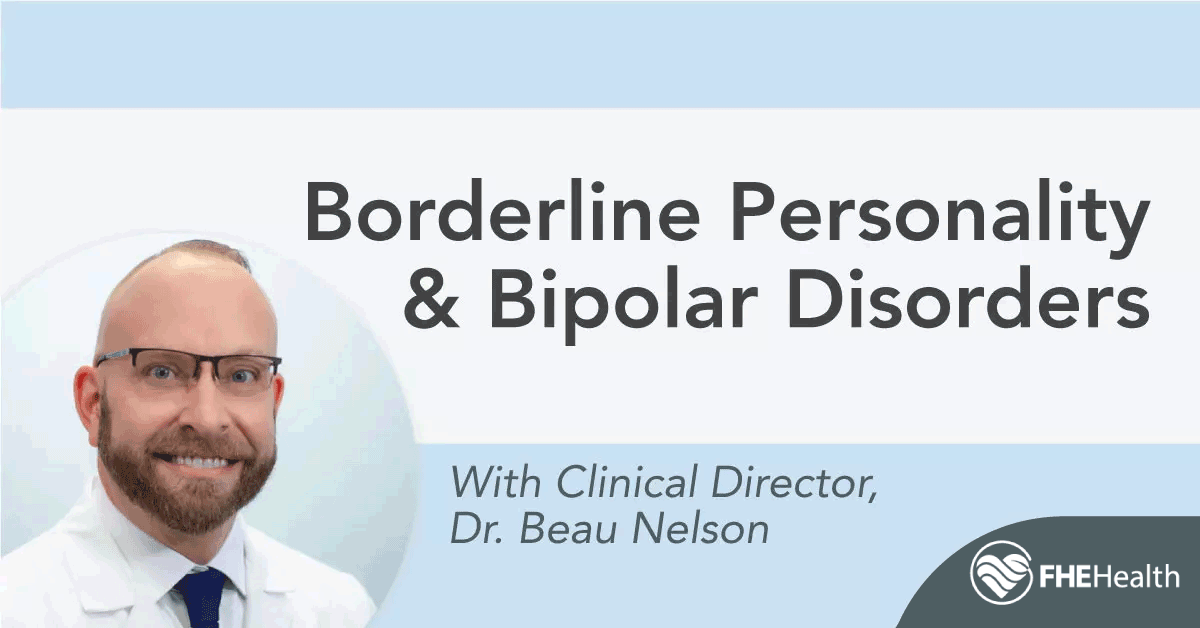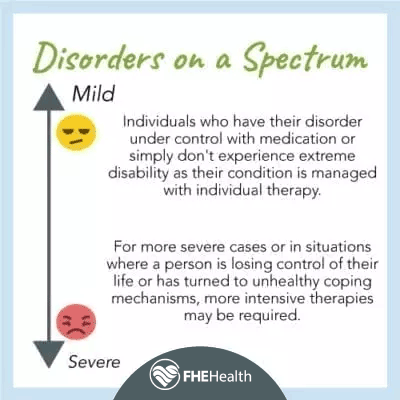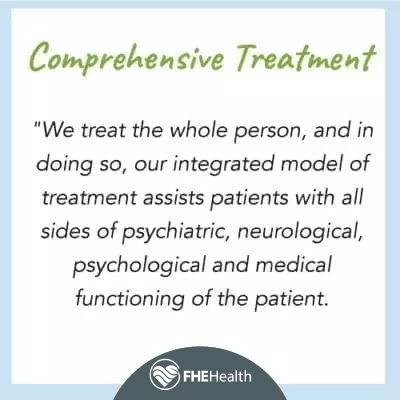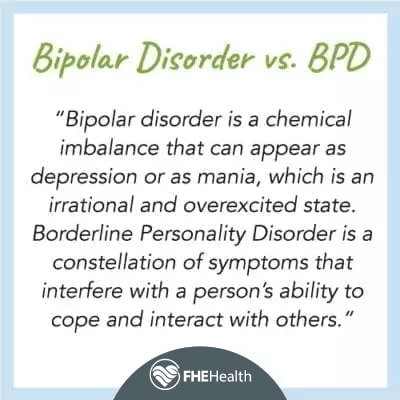
At FHE Health, we believe in treating the whole person, not just their symptoms. By taking a holistic approach to behavioral health treatment, we address both substance use disorders and the underlying mental health disorders and co-occurring disorders that often accompany them.
Dr. Beau A. Nelson, DBH, LCSW and Chief Clinical Officer at FHE Health, provides some information about both borderline personality disorder (BPD) and bipolar disorder, including approaches for treating these disorders and their potential impact on alcohol or drug addiction treatment.
Borderline Personality Disorder vs. Bipolar Disorder
The team at FHE Health is experienced in diagnosing a broad range of mental issues, including those with overlapping symptoms, such as BPD and bipolar disorder
“We treat BPD and bipolar disorder,” says Dr. Nelson. “Bipolar disorder is a chemical imbalance that can appear as depression or as mania, which is an irrational and overexcited state. Borderline personality disorder is a constellation of symptoms that interfere with a person’s ability to cope and interact with others.”
The Key Differences Between Borderline Personality Disorder vs. Bipolar
Bipolar disorder and borderline personality disorder (BPD) can share some symptoms, such as mood swings, but they have distinct causes and manifestations. Bipolar disorder is primarily linked to chemical imbalances in the brain, where certain elements are out of balance, causing the brain to function improperly. In contrast, BPD is considered psychological, often rooted in emotional and relational patterns, sometimes arising from trauma or early life experiences.
Because bipolar disorder is chemical in origin, finding the correct medication protocols and ensuring compliance is crucial for effective treatment. Medications can help manage the symptoms and balance the brain’s chemistry. On the other hand, while medications may be used in treating BPD, they typically address symptoms rather than the root causes of the disorder. Understanding these differences is essential for proper diagnosis and treatment, as the strategies for managing each condition can vary significantly.
Bipolar vs. Borderline Personality Disorder Symptoms
Bipolar Disorder Symptoms |
Borderline Personality Disorder Symptoms |
|
|
The Link Between BPD and Bipolar Disorder
Dr. Nelson notes that there isn’t a specific link between the two disorders. In fact, even having the two disorders together is rare.
“One can exist without the other and vice versa,” he says. “It is possible to have both conditions, although that is not commonly seen in most patients.”
This is one reason it’s essential to talk to a trained mental health professional when you’re experiencing symptoms that might be behavioral. Finding the right diagnosis is critical to getting the right treatment, but to the untrained eye, some of these disorders may appear similar or related.
Is There a Spectrum for These Disorders?
 Any mental or physical health condition can present with varying severity, says Dr. Nelson. When it comes to BPD or bipolar disorder, he notes that “some people might have smaller issues that interfere with their functioning while others are almost completely incapacitated” if their condition is not treated in some way
Any mental or physical health condition can present with varying severity, says Dr. Nelson. When it comes to BPD or bipolar disorder, he notes that “some people might have smaller issues that interfere with their functioning while others are almost completely incapacitated” if their condition is not treated in some way
For this reason, there are different levels of treatment for both disorders. Individuals who have their disorder under control with medication or simply don’t experience extreme disability because of their disorder might be able to manage the condition with individual therapy. Typically, this involves seeing a licensed clinical social worker or psychiatrist periodically. The individual’s treatment plan and professional recommendations provide for the schedule of therapy, which can range from once a week to a few times a year.
For more severe cases or in situations where a person is losing control of their life or has turned to unhealthy coping mechanisms such as drug or alcohol abuse, more intensive therapies may be required. That might include intensive outpatient therapy or residential treatment in an inpatient program
What Is the Impact of Drug Use on These Conditions?
Drug use is damaging to the brain under any condition, says Dr. Nelson. Most drugs cause chemical changes or reactions in the brain, damaging both the cognitive matter itself and the brain’s ability to communicate effectively with the rest of the body. This is because drugs act on the neurotransmitters in the brain (that’s what the brain uses to handle all that communication).
“Numerous conditions and structures in the body are damaged through drug or alcohol use,” says Dr. Nelson. “Some of these effects can diminish over time (when someone stops using), although there may be some damage that is irreversible.”
When you combine a condition that involves a chemical imbalance in the brain, such as bipolar disorder, with drug or alcohol use, you can exacerbate the impact of both issues. In some cases, individuals with BPD or bipolar disorder start abusing drugs or alcohol as a way to self-medicate to address the symptoms of their mental illness. This can ultimately make their mental health condition worse and add an addiction to be faced.
Holistic Treatment for BPD and Bipolar Disorder at FHE Health
“We treat the whole person,” says Dr. Nelson, “and in doing so, our integrated model of treatment assists patients with all sides of psychiatric, neurological, psychological and medical functioning of the patient. This approach allows us to address psychological issues such as behaviors and coping skills, moderate symptoms and treat the brain through medical, psychiatric and medical interventions so that all parts are working at their best.”
FHE Health doesn’t specialize only in mental health or only in substance abuse treatment. The teams provide holistic treatment that addresses the entire person. If you’re struggling with an addiction complicated by mental health issues (or vice versa), you can find treatment that takes the big picture into account. That results in an increased likelihood of long-term success and prepares you for sobriety and compliance with mental health treatments when you return to regular life
 Individualized Therapies and Medication Management
Individualized Therapies and Medication Management
The therapists, doctors, and others at FHE Health work with every individual to understand exactly what treatment methods may work for them. Methods might include options such as cognitive behavioral therapy, neuro-rehabilitation, and even medication.
“There is no medication for BPD,” says Dr. Nelson, “so we generally manage the symptoms of this disorder. Medication can be helpful when there are mood or other issues that are a part of the presentation of the patient. Bipolar disorder is generally accepted to have to be treated with medication, and this is the standard in psychiatric practice.”
An important factor in treatment that takes the entire person into account is that therapists and doctors understand how any addiction or drug use may impact medical treatments. They can work specifically with patients to ensure mental health medication regimes align with sobriety goals.
Reach Out to FHE Health for Help Today
Whether you’re experiencing mental health symptoms or struggling with addiction — or both — timely treatment can help pave the road to recovery. Contact FHE Health today to learn more about treatment options for bipolar disorder, BPD and addiction.







